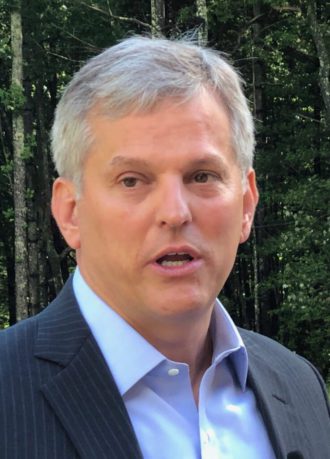By Peter H. Lewis and Sally Kestin, Asheville Watchdog
The North Carolina attorney general’s office had “great concerns about how HCA was selected” as the purchaser of the Mission Health System, including that “the deck had been stacked in its favor from the beginning” by then-CEO Dr. Ronald A. Paulus and his advisor Philip D. Green, according to a 2018 internal document obtained by Asheville Watchdog.
“[W]ith no outside advice other than Phil Green,” whom the investigators wrote had an undisclosed “prior business relationship with HCA,” Mission Health’s board of directors decided not to issue requests for competitive bids or to hold an auction before agreeing to sell Asheville’s flagship hospital system to HCA Healthcare for $1.5 billion, according to the document, prepared in advance of a meeting between Department of Justice lawyers and HCA representatives Oct. 30, 2018.
Instead, as Paulus “coached HCA behind the scenes on how to best present its case to the Mission Board,” the board invited only one other healthcare company — identified in other documents as Novant Health of Winston-Salem — to present a formal offer.
“In the end,” the document stated, “an outside observer could conclude that HCA rose to the top among a limited number of bidders because the deck had been stacked in its favor from the beginning by Dr. Paulus and Mr. Green.”
The attorney general’s office was so concerned about potential conflicts of interest by Paulus and Green that it requested the Mission board revote on the transaction, the attorney general’s deputy chief of staff, Laura Brewer, wrote to Asheville Watchdog this week. After considering the information, the Mission board voted again, unanimously, to approve it.
Paulus did not respond to Asheville Watchdog’s requests for comment. Green declined an interview request but noted that the attorney general, after an extensive review, did not object to the sale.
Only HCA, Novant, and Atrium considered
The Oct. 30 document, written by Special Deputy Attorney General Jennifer T. Harrod, who led the N.C. Department of Justice investigation, was among more than 6,000 records released Feb. 25 by the office of Attorney General Josh Stein in partial response to public records requests filed by Asheville Watchdog over the past two years.
The documents contain details not previously made public about the sale of the 133-year-old nonprofit hospital system, including that, other than HCA and Novant, Carolinas HealthCare System (now Atrium Health) was the only other healthcare company that the Mission board seriously considered. But Carolinas was rejected quickly and not even invited to make a presentation to the board, the records show.
The documents confirm and expand on Asheville Watchdog’s previous reporting on the role played by Paulus and Green. They show Green negotiated proposed term sheets — nonbinding proposals — for both a $1.5 billion sale of substantially all of Mission’s assets to HCA and for a $650 million joint venture with HCA that would have preserved some local control. HCA provided Paulus with a written affiliation proposal on Aug. 12, 2017, six weeks before the Mission board authorized Paulus to engage in calls and meetings with potential affiliation partners.
Overall, the newly released documents raise serious questions about the role of Paulus, Mission’s president and CEO; his longtime personal friend and advisor Green; and the 18-member Mission board of directors, which investigators said seems to have accepted HCA’s arguments about cost-savings and improved quality of care “uncritically.”
Paulus’s emails examined
Under state law, the attorney general has the right to review any transaction in which a nonprofit corporation sells substantially all of its assets. The investigation of the proposed Mission deal began in May 2018.
By October 2018, Harrod and other lawyers in the attorney general’s office had examined thousands of documents related to Mission’s decision to sell, including Paulus’s and Green’s email exchanges with HCA and other potential partners, and minutes of Mission board meetings.
On the afternoon of Oct. 30, 2018, Harrod, at least two other lawyers with the N.C. Department of Justice, and four representatives of HCA met at the attorney general’s office in Raleigh. No one from Mission attended, the records show.
“We see that HCA’s purchase of Mission brings something new and dynamic to the region,” Harrod wrote in an opening statement. She said the Department of Justice investigators had met the previous week with the chairman and vice-chairman of Mission’s board, who talked “about how much HCA’s efficiency, commitment to patient care, and sophisticated data analytics impressed them.”
“At the same time,” she continued, “we have great concerns about how HCA was selected to be the entity that purchased Mission.”
“Here are the facts as we currently understand them,” Harrod wrote:
- Paulus and Green “steered the process by which other bidders were identified. Mission decided, with no outside advice other than Phil Green, not to put out a request for bids or hold an auction.”
- Green had “a prior business relationship with HCA” that “was never disclosed to the Mission board.”
- When Mission’s board members visited HCA headquarters, “Dr. Paulus and Mr. Green both thought it was critically important for Mr. Green to attend that meeting to ensure its success.”
- “Dr. Paulus coached HCA behind the scenes on how to best present its case to the Mission Board. On two occasions, he pointedly told HCA that Mission’s peers were and would favorably consider being acquired by HCA.”
- Paulus discussed his continued role with potential buyers. One wanted him to be chief information officer. “Later, that partner was dropped from consideration on grounds that appear pretextual to us … Reading his email exchanges with HCA, an outside observer could conclude that he was working hard to demonstrate his value to HCA,” the memo states. (Just days after the Mission sale closed, Paulus announced he was joining HCA as a strategic advisor. Tax records show Paulus received more than $4 million for his final four months at Mission. The terms of his employment agreement with Mission and his consulting job with HCA remain unknown. A spokeswoman for HCA’s North Carolina Division said Paulus is no longer a strategic advisor to HCA.)
- “Neither the board nor its advisors seems to have given any thought to the fact that certain transaction partners offered Dr. Paulus greater scope for advancement versus others or versus no transaction at all,” Harrod wrote.
- “In our opinion, Dr. Paulus’s conduct violated the Mission conflict of interest policy, which requires an officer or board member with even a potential conflict to not merely recuse himself from voting on the matter, but also from advocating for an outcome. Dr. Paulus offered to recuse himself, but was advised that it was unnecessary. The rationale was that since all of the potential partners wanted Dr. Paulus to continue in some capacity, therefore he had no conflict of interest.”
“Just have to trust HCA”
Harrod had already expressed concerns to Mission that the terms outlined in the Letter of Intent negotiated by Paulus and Green did not go far enough in protecting the public’s interests.
“Given Mission Health’s strong operating and financial position, we believe Mission should be well positioned to negotiate for strong terms to protect public health interests, as has been done in other similar transactions,” she wrote to Mission officials Aug. 8, 2018.

Instead, on Aug. 30, 2018, HCA and Mission signed an official contract, called the asset purchase agreement, on terms the attorney general’s office believed favored HCA.
“Dr. Paulus and Mr. Green were principal negotiators of the APA,” Harrod wrote in her memo in advance of the Oct. 30, 2018 meeting. “It appears to us comparing the terms of the LOI to the terms of the APA, HCA improved its position considerably.”
“One of the major inducements for Mission to enter the LOI with HCA was the promise that hospitals and services would be maintained,” Harrod wrote. “We and others advised Mission prior to signing the APA, that such commitments needed to be specific and measurable in order to be enforceable.”
“The emails we have seen demonstrate that Dr. Paulus ultimately buckled in the face of resistance from HCA and decided that Mission would just have to trust HCA,” she wrote.
Harrod wrote, “Even now, the board believes that HCA has committed to maintaining the current level of services … even though the APA says no such thing.” For example, the agreement allowed HCA to eliminate some services and close facilities if they became “commercially unreasonable,” documents show.
Harrod also wrote that “Mission agreed to let HCA use its existing charity care policy, even though it appears to us that for most patients, they would be much better off under Mission’s policy.” Weeks earlier, lawyers for both HCA and Mission had written to Harrod that HCA’s charity care policies were “more generous in most respects” than Mission’s policies.
HCA’s $188 million settlement
In January 2017, six months before beginning discussions with Paulus and Green, HCA agreed to pay $188 million to settle litigation over its failure to abide by the terms of its purchase of nonprofit Health Midwest hospitals in the Kansas City area, a transaction similar to its later deal with Mission Health.
In a letter Sept. 10, 2018, Harrod asked Mission senior vice president Donald R. Esposito to “[d]etail the assurances Mission has received that HCA will honor its contractual obligations, in light of its failures to do so in connection with its acquisition of Health Midwest.”
In her document for the Oct. 30, 2018 meeting, Harrod stated: “Despite the experiences of the health care foundation in Missouri, Mission agreed to dispute resolution terms that overwhelmingly favor HCA.”
“These are examples, not an exclusive list,” Harrod concluded.
“The best possible deal”
The attorney general’s investigation intensified over the next two months and included ensuring that Mission’s board knew about Green’s prior business relationship with HCA.
“We requested that the board be fully informed of this relationship and then take another vote on the deal,” Brewer, the deputy chief of staff, told Asheville Watchdog this week. “We also ensured that Mr. Green would not receive any compensation dependent on closing of the transaction, including any ‘bonus’ or ‘success fee,’ and that neither he nor his company would otherwise benefit from the transaction.”
The Mission board held special sessions Dec. 13 and Dec. 20, 2018, and Jan. 8, 2019, to discuss final details of the pending deal, including the findings of Harrod’s investigation.
In the end, Mission Board chairman John R. Ball wrote, in a letter to Stein after the Jan. 8 meeting, that the board considered the attorney general’s concerns and “concluded that Mission’s management team and its outside advisors were committed at all times to securing for Mission the best possible transaction with potential merger partners, ultimately leading to the transaction with HCA.”
“No member of Mission’s management or its advisors took any action, or failed to take any action, that was detrimental to Mission’s interests,” Ball wrote.
The Mission board, Ball wrote, “believes it has been, and remains fully informed with respect to all these issues,” and was “steadfast” in its goal to close the sale to HCA. The board’s re-vote was once again unanimous.
Ball could not be reached for comment.
Letter of non-objection

In an August 2021 interview with Asheville Watchdog, Stein said state law limited his authority to halt the sale despite the information uncovered by his investigation. Because of the law’s restrictions, Stein said, he sought specific enforceable agreements, a number of concessions from HCA, and 15 additional conditions to be added to a revised asset purchase agreement.
Stein’s conditions included the hiring of an independent monitor to oversee HCA’s compliance with the agreement; enforceable commitments to maintain current levels of service at all six hospitals in the Mission system, not for the five years Paulus and Green negotiated in some cases, but for 10 years; and requiring HCA to adopt what he viewed as Mission’s more generous charity care obligations.
Stein also got HCA and Mission to agree that the attorney general could enforce the terms of the contract.
On Jan. 16, 2019, Mission and HCA agreed to the attorney general’s changes and signed an “amended and restated” asset purchase agreement. Harrod then informed them that the attorney general would not object to the sale.
Green: “Concerns were baseless”
Green declined to speak with Asheville Watchdog but emailed a statement. “The Attorney General, after reviewing thousands of pages of documents and conducting an inquiry into ensuring a fair process and the absence of any conflict of interest, concluded that any concerns were baseless and wrote a Non-Objection letter,” he wrote.
The letter of non-objection, written by Harrod, actually said the Attorney General’s investigation had identified “potential concerns.” But, it said, “Mission Health has represented to the Attorney General that … no one on Mission’s board and no one responsible for advising Mission’s board will receive any direct or indirect benefit as a result of the sale of the operating assets of the Mission Nonprofit Entities to HCA.”
Green is still listed as an independent advisor for large healthcare mergers and acquisitions and has a consulting company based in Arlington, Virginia. Paulus is still a principal of RAPMD Strategic Advisors, based in Asheville.
Update from Stein’s office
Harrod, who led the investigation into the Mission-HCA sale, is no longer with the Attorney General’s office. She declined to comment for this story.
In a statement to Asheville Watchdog last week, Brewer, Stein’s deputy chief of staff, wrote, “Under North Carolina law (unlike in many other states), the Attorney General’s authority in these kinds of deals is quite limited” to ensuring a fair purchase price and “that the charitable mission of the non-profit is being carried forward.”
“North Carolina law does not give our Office the general authority to police health care transactions based on how they would impact patients, quality of care, rural access, and other issues,” Brewer wrote. “Even though the Attorney General’s legal authority over this type of transaction is quite limited, we succeeded in negotiating a number of significant improvements to the agreement.”
“Paying more and getting less care”
HCA officially took control of the Mission system Feb. 1, 2019.
Novant, the lone other bidder that Mission’s board rejected in favor of HCA’s $1.5 billion offer, went on to sign a $5 billion deal, including $2 billion in cash, to acquire a smaller and less profitable hospital in Wilmington.
The Attorney General’s office denied Asheville Watchdog’s request for a comparison of Novant’s and HCA’s offers for Mission, citing state statutes that exempt confidential business information from public records requests.
Ashton W. Miller, Novant’s manager of public relations, declined to comment.
In the statement she prepared for the Oct. 30, 2018 meeting with HCA representatives, Harrod wrote: “We understand that HCA plans to do further acquisitions in North Carolina. This may not be the last time we are across the table from each other.”
Last week, when Asheville Watchdog asked what lessons were learned from the Mission sale, Attorney General Stein responded:
“Too often, when one hospital swallows up another, patients end up paying more and getting worse care. North Carolinians need better safeguards to review transactions to put the patients’ interest first. I’m working with partners in the legislature now to determine how our laws can better protect patients in these health care transactions.”
Asheville Watchdog is a nonprofit news team producing stories that matter to Asheville and Buncombe County. Peter H. Lewis is a former senior writer and editor at The New York Times. Email plewis@avlwatchog.org. Sally Kestin is a Pulitzer Prize-winning investigative reporter. Email skestin@avlwatchdog.org.
Asheville Watchdog gratefully acknowledges the assistance of the Duke University School of Law’s First Amendment Clinic, with special thanks to Danielle Siegel, Alexandria Murphy, Ben Rossi and Dillon Farnetti.




In a truly functioning criminal justice system -which we do not have in this country… especially when it comes to blue collar crime- Paulus and Green would be prosecuted …along with HCA… for colluding to commit fraud. And, to make the matter worse, the so-called Board of Trustees of Mission provided Paulus and Green with all the cover they needed to commit this massive fraud. Paulus then went on to officially “work” for HCA after the fire sale he and Green so adroitly engineered… shocking I know. Think of this way… systemic corruption within our healthcare system -HCA being the poster child for this- was unwittingly aided and abetted by the gross incompetence of Mission’s Board of Trustees…. a match make in heaven… at least for HCA…. to the tune of several billion dollars.
I have not stepped foot in a Mission/HCA facility since this all started…currently researching a move to a town with actual quality medical care. Durham is number one so far. Screw medical organizations that can’t even set a basic rule of pandemic vaccination for all staff…PERIOD. What an insane world we live in; science is fiction and heinous lies are facts.
Could MX and the reporters please name all the Mission Board members at the time this malfeasance was underway?
Ron Paulus was only on the job a few months when screen savers all over Mission Hospital began asking employees to vote for him as the GOAT. Ironic when you consider that he was really just a merc who was hired to sell Mission to a sugar daddy.
AVL Watchdog has exposed this situation before (https://smokymountainnews.com/archives/item/30102-a-done-deal-how-mission-health-wooed-hca). Why was there no local indignation then? Why is there no reaction now? No legal recourse?
Not unlike other massive corruption stories in our country involving wealthy/smug/self-entitled (even treasonous) white men doing whatever they want to serve their own interests and not being held accountable. For instance, why are Trump, Meadows, Pompeo, Navarro, Cawthorn, Jim Jordan and others not in jail?